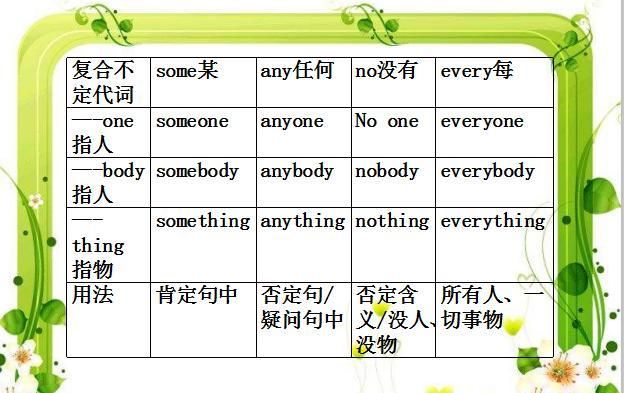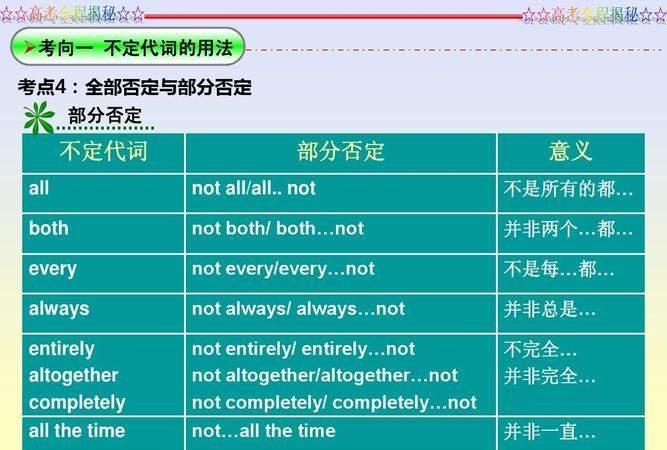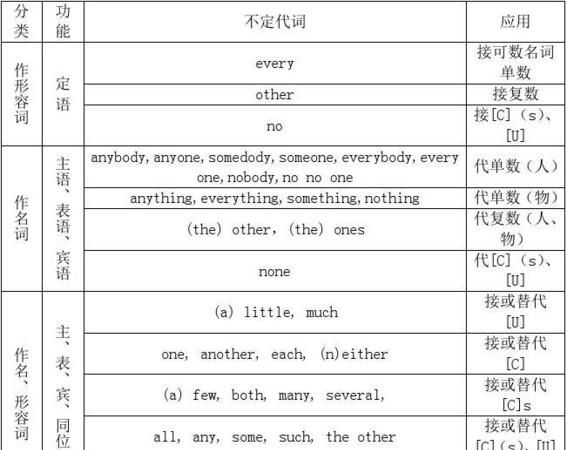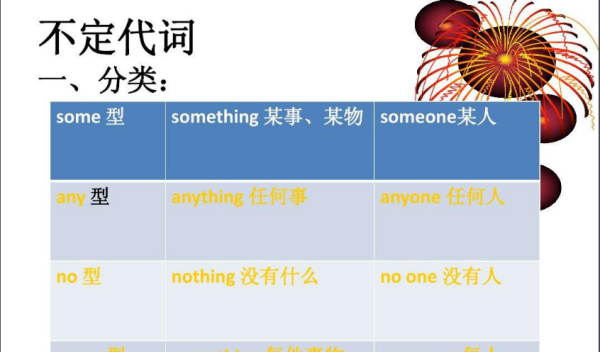本文目录
不定代词有哪些及意思
英语的不定代词有很多:all, each, both, either, neither, one, none, little, few, many, much, other, another, some, any, no, a few, a little, enough, every 等,以及由 some, any, no 和 every 构成的合成代词(即somebody, anyone, nothing )等。
all 全部;each 每个;both 两者都; either 两个中的一个;neither 两个中的一个不;one 某个;none 全都不;little 没有多少(后跟不可数名词);few 没有多少(后跟可数名词);many 许多(后跟可数名词);much 许多(后跟不可数名词);other 其他的; another (三者以上的)另一个;some 一些;any 任何一个; no ……都不;a little 一些(后跟不可数名词);a few 一些(后跟可数名词);enough 足够的;every 每个。
在这些不定代词中,多数都能作主语、宾语、表语或定语,但是代词 none 以及由 some, any, no 和 every 构成的合成代词只能作主语、宾语或表语,不能作定语,而 no 和 every 则只用作定语。
推荐链接:
不定代词用法归纳(详细讲解):
***/Article/200802/103.html
不定代词用法总结
***/link?url=RcZ3VOpWAzhIzXejER9KuaM1ISJuabL_FcOPskQXkFmEWQWIeiD5zz8gG7veKJyc3LIv-Sf6N6qMnV-ei5cpKAkEGYL3cS875_59Mh8er9e

不定代词用什么指代
不定代词:不指明代替任何特定名词或形容词的代词叫做不定代词。常见的有:
some, somebody, someone, something, any, anybody,anyone, anything, no, nobody, no one, nothing, all, both, neither, none, either,each, every, everybody, everyone, everything, other, another, much, many, few, a few, little, a little,one等等。
不定代词的功能:
1、 做主语:
Is everybody here?
All is well and ends well.
Nobody else said anything.
2、 做宾语:
I know a little about the novel.
I am speaking for myself, not for others.
Here are two books,you can take either of them.
3、 做表语:
That’s all for today.
It’s too much.
I’m not somebody, I’m nobody.
4、 做定语:
Each book on the shelf is worth reading。
Let me have another cup of tea.
Many people attended the meeting.
5、 做状语:(部分代词)
The film lasted some two hours.
Ts she any better today?
They will come back a little later.
all, ever, each
each,可以指小到两个,all、every 则至少指三个。
all 表所有项目的总和,是一个不可分割的整体。
eg:All the students contributed to the fund.
every 是由各个项目集合而成一个整体,其构成成分有共性。
eg:every child in the class passed the exam.
each 的注意力集中在个别项目上,其构成成分各具特性。
eg:I asked all the children,each told a different story.
注意: 修饰单数可数名词包括集体名词,一般用the whole.
eg:The whole pie was eaten.
The whole class was invited to the party.
some, any
any和some 皆表示不定量,都可接可数和不可数名词。any 多用于疑问句、否定句,有时也用于肯定句;some多用于肯定句,偶尔也用于疑问句。
any
1、Are there any stamps in the drawer?
2、He did not make any mistakes in his spelling.
3、He came without any money。
4、She kissed her brother,but was afraid to ask any questions.
5、We had no idea that any serious losses had been inflicted on the company.
some
Some people are early risers.
The mother is doing some washing now.
I read about it in some book.
Are there some stamps in the drawer?(说话人知道,只是想证实而已)
I do not like some of them.(部分)
Would you like some beer?
everybody, everyone, one
everybody/everyone和every 一样,都含有“各个”的意思,但前者多指所有的人;后者多指说话人所熟悉的人。
everybody/everyone eg:
Everybody’s business is nobody’s business.
In here everyone is a comrade.
one:泛指人时相当于you,we等。
One does not like to have one’s word doubted.(美语中,常用his 代替 one’s)
no one ,none
no one 仅指人,none 可以指人也可指物。no One= nobody
eg:No one failed the exam.
No one come to see me.
none:
None of the students failed the exam.
None but the lonely heart can know my sorrow heart.
both,two
强调两个人或物时(不止是一个),才用both。eg:
There were two dogs on the porch. Both were fast asleep.
The two of them were invited.
Notice will be sent to the two of you.
other,another
other常与复形名词以及单形不可数单词连用分别表示复念和零念。当前面加上“the, this, that, some, any, each, every, no, none, one, or ”以及形容词性物主代词时,表示单念。eg:
Jones is here,but where are the other boys?
Moral beauty ought to be ranked above all other beauty.
Each member must bring on other person.
She only comes every other day.
I read it in some book or other.
Any other person than her husband would have lost patience with her.
other 有复数形式:others
We should not think only of our own children, there are others to cared for also.
The search party was divided into two groups. some went to the right, others went to the left.
another:表示单念,可数,做定语时后接单形名词或代词one.
Do not say another word.
Where can we find another like her?
This pen does not work i must buy another.
Tell them I am not very well. I will go and see them another day.
注意:another day 指未来,the other day指过去。

英语:什么是不定代词?有哪些?详细!
首先说它是代词,但是天不确定到底是指某个具体的人还是物,所以称其为不定代词
1.不定代词one单独使用,泛指‘人.人们.一个人’.one. ones 可指代具体的人或物,也可指代前面出现过的名词.
2.some及其合成词someone ,somrbody, something.用在肯定句中表肯定含义,用在疑问句中表期待肯定回答的请求,建议.、
3. either,neither,both 都表两者之间,either指‘两者中任意一个’,表肯定.neither 指‘两者都不’,表否定.both指‘两者都’,表肯定.
4.each侧重个体,意为‘每一个’.形容词every 侧重全体,意为‘每个’
5.all指‘三者或三者以上都’,表肯定.none指‘三者或三者以上都不’,表否定
6.another表泛指,指‘众多中的又一个,另一个’,前面不加冠词;the other 表特指,指‘两者之中的另一个’.
7.many, much 表示‘许多’,many 修饰可数名词复数 ,much 修饰不可数名词,主要用于否定句和疑问句.
8.a few ,a little 都表肯定,指‘一些,一点儿’,a few 修饰可数名词,a little 修饰不可数名词.few ,little 都表否定,指‘很少,几乎没有’,few 修饰可数名词,little修饰不可数名词
主要的就是这些

什么是不定代词
不定代词,是英语语法术语,在句中可以作主语、宾语、表语、定语和状语。不定代词是不指明代替任何特定名词或形容词的代词。
常用不定代词有:some(something,somebody,someone),any(anything,anybody,anyone), no(nothing,nobody,no one), every(everything,everybody,everyone),all,each,both,much,many,(a)little,(a)few,other(s),another,none,one,either, neither等。

扩展资料:
不定代词的用法:
不定代词大部分可以代替名词和形容词,在句中作主语、宾语、表语、定语和状语。
1,作主语:
Both of them are teachers.他们两人都是教师。
做主语时谓语动词用复数
2,作宾语
I know nothing about this person.我对这个人一无所知。
3,作表语:
This book is much too difficult for a child.这本书对一个小孩来说太难了。
4,作定语:
There is a little water in the glass.玻璃杯里有一些水。
可以在强调一下a little,little,a few,few的区别:
a little通常带有肯定的意思,表示还有一点;而little带有否定的意思,只剩一点儿了。(little后通常加不可数名词)a few和few同上。(后通常加可数名词)口诀:有a就有(有一点),没a就没有(几乎没有)。
有些不定代词用于指两者(如both,either, neither),有的不定代词用于指三者(如all,any, none, every),注意不要弄混:
Both of my parents are doctors. 我的父母都是医生。
All of the students are interested init. 所有的学生对此都很感兴趣。
There are trees on any side of thesquare. 广场的每一边都种有树。
He has two sons, neither of whom isrich. 他有两个儿子,都不富有。
He has three sons, none of whom is rich. 他有三个儿子,都不富有。
参考资料:百度百科-不定代词
以上就是关于所有不定代词的意思 ,不定代词有哪些及意思的全部内容,以及所有不定代词的意思 的相关内容,希望能够帮到您。

